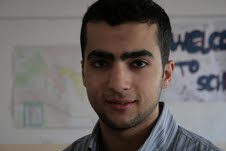
By Meer Ako Ali:
This Monday, November 14, 2011 marks the 227th birthday of Sulaimany. Hailed as “the city of efforts and sacrifices” and praised for its cultural significance, Sulaimany is one of the most significant Kurdish cities. The anniversary of the establishment of this city deserves to be cherished and celebrated by all.
Located in the northeastern ‘tip’ of Iraq and surrounded by several mountain ranges, Sulaimany was established on November 14, 1784 by Ibrahim Pasha, the Baban Prince whose bust now looks over Serah Square. This city became the capital of the Baban Principality and was named after Ibrahim Pasha’s father, Sulaiman Pasha.
Sulaimany was built on Melkandi Hill in a region historically called Zamwa; Melkandi Hill is the modern-day site of the Daboka Bazaar. Ibrahim Pasha reportedly founded Sulaimany because the Baban Domain was growing too large for its previous capital in Qallachwalan. Sulaimany, unlike Qallachwalan, was safer and broader and could better fit the prospering Babans.
Ibrahim Pasha invited dwellers of neighboring villages and emirates to come settle in Sulaimany. Kurds from around Iraq, Iran, and Turkey came to start afresh in Sulaimany; the new city offered much security and opportunity. This provided Sulaimany with a diverse population of Muslims, Christians, and Jews which in turn aided the industry and trade of the city. Products and produces of various kinds including soap, wheat, Klash, ice, and tree gum were implemented in the city, each by one of the different groups of settlers.
Though Sulaimany is a comparatively new city, it has made invaluable contributions to the Kurdish cause and has bred some of Kurdistan’s most prominent writers, poets, freedom fighters, and activists. Sheikh Mahmud Hafid, Piramerd, Mawlawi, Nali, Kak Ahmedi Sheikh, Hafse Khani Naqib, Rafiq Hilmi, Ibrahim Ahmed, Muhammad Amin Zaki Bag, Muhammad Salih Dilan, Sherko Bekas, and Bakhtyar Ali are only some of the most notable characters of Sulaimany.
The emergence of so many brilliant minds and activists in and around Sulaimany led to the city’s recognition as the center of Kurdish patriotism and literature. A number of the greatest Kurdish revolutionary acts and cultural breakthroughs were carried out in Sulaimany. The people of Sulaimany had big roles in defying English colonialism and Saddam’s Baath regime and they ultimately developed Sorani Kurdish as the main literary dialect. The people of Sulaimany continue to play major roles in the Kurdish cause and the resolution of Kurdish issues.
The anniversary of the establishment of Sulaimany has been welcomed with festivities of all sorts. Poets usually dedicate poems, writers books, producers documentary movies, artists paintings, and musicians songs in honor of Sulaimany on every November 14.
In recent years, distinguished social, cultural, and literary clubs and groups have gone to great lengths in celebrating the anniversary of the establishment of Sulaimany by organizing events and banquets in which traditional and modern Kurdish music, stories, and poetry are enjoyed by the invitees. These events offer a nostalgic environment in which the attendees enjoy Kurdish music and stories and reunite with acquaintances and fellow city-men. A common theme of these events is provided by Sheikh Razay Talabani’s poem; Sheikh Razay says, “I remember when Sulaimany was the capital of Baban; it was neither ruled by the Persians nor the Ottomans.” At the end of these events, everyone goes home feeling more patriotic and anticipating the next anniversary of Sulaimany’s establishment.
Sadly, these events are mostly directed by an elite group who are considered to be the ‘natives’ of Sulaimany. But the truth is that everyone living in Sulaimany has their affections centered in Sulaimany and excluding them from such events would make it seem otherwise. So, on this Monday, let us all celebrate together the birthday of Sulaimany and remind ourselves of the “efforts and sacrifices” made by our people; after all, as they say, the more the merrier.
.jpg)



well done Kak Meer thank you for such a nice article and you told us the history of sulaymani.But today what happened to sulaymani with all these history,the corruption is everywhere and the injustice became the daily routine .
I believe the history of Sulaimaniya is much older than what it has been said. If we could look to history of the area we could see that sulamani city called celona and it was the trade passageway between Asia and the Mediterranean Sea. It is essential to conduct more researches about the history of the city